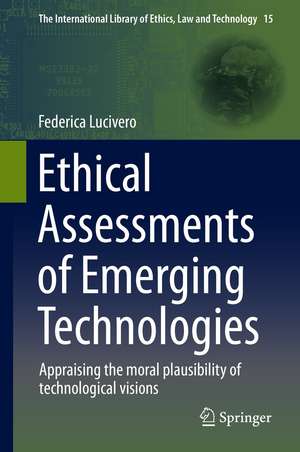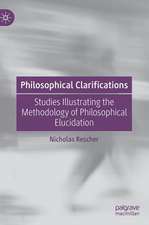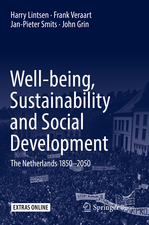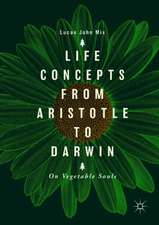Ethical Assessments of Emerging Technologies: Appraising the moral plausibility of technological visions: The International Library of Ethics, Law and Technology, cartea 15
Autor Federica Luciveroen Limba Engleză Hardback – 23 noi 2015
| Toate formatele și edițiile | Preț | Express |
|---|---|---|
| Paperback (1) | 361.42 lei 38-44 zile | |
| Springer International Publishing – 23 aug 2016 | 361.42 lei 38-44 zile | |
| Hardback (1) | 374.76 lei 38-44 zile | |
| Springer International Publishing – 23 noi 2015 | 374.76 lei 38-44 zile |
Din seria The International Library of Ethics, Law and Technology
- 15%
 Preț: 700.75 lei
Preț: 700.75 lei - 20%
 Preț: 982.84 lei
Preț: 982.84 lei - 15%
 Preț: 642.83 lei
Preț: 642.83 lei - 15%
 Preț: 643.65 lei
Preț: 643.65 lei - 18%
 Preț: 832.11 lei
Preț: 832.11 lei -
 Preț: 374.37 lei
Preț: 374.37 lei - 15%
 Preț: 647.73 lei
Preț: 647.73 lei -
 Preț: 395.47 lei
Preț: 395.47 lei - 15%
 Preț: 586.23 lei
Preț: 586.23 lei - 15%
 Preț: 583.28 lei
Preț: 583.28 lei - 5%
 Preț: 1098.84 lei
Preț: 1098.84 lei - 15%
 Preț: 581.33 lei
Preț: 581.33 lei - 15%
 Preț: 589.14 lei
Preț: 589.14 lei - 15%
 Preț: 693.57 lei
Preț: 693.57 lei - 18%
 Preț: 725.43 lei
Preț: 725.43 lei - 15%
 Preț: 642.68 lei
Preț: 642.68 lei - 15%
 Preț: 640.37 lei
Preț: 640.37 lei -
 Preț: 288.27 lei
Preț: 288.27 lei - 24%
 Preț: 644.82 lei
Preț: 644.82 lei - 18%
 Preț: 736.94 lei
Preț: 736.94 lei - 15%
 Preț: 640.37 lei
Preț: 640.37 lei - 15%
 Preț: 636.12 lei
Preț: 636.12 lei - 15%
 Preț: 638.24 lei
Preț: 638.24 lei - 5%
 Preț: 713.18 lei
Preț: 713.18 lei - 15%
 Preț: 637.78 lei
Preț: 637.78 lei
Preț: 374.76 lei
Nou
Puncte Express: 562
Preț estimativ în valută:
71.71€ • 75.07$ • 59.34£
71.71€ • 75.07$ • 59.34£
Carte tipărită la comandă
Livrare economică 01-07 aprilie
Preluare comenzi: 021 569.72.76
Specificații
ISBN-13: 9783319232812
ISBN-10: 3319232819
Pagini: 150
Ilustrații: XIX, 202 p.
Dimensiuni: 155 x 235 x 20 mm
Greutate: 0.49 kg
Ediția:1st ed. 2016
Editura: Springer International Publishing
Colecția Springer
Seria The International Library of Ethics, Law and Technology
Locul publicării:Cham, Switzerland
ISBN-10: 3319232819
Pagini: 150
Ilustrații: XIX, 202 p.
Dimensiuni: 155 x 235 x 20 mm
Greutate: 0.49 kg
Ediția:1st ed. 2016
Editura: Springer International Publishing
Colecția Springer
Seria The International Library of Ethics, Law and Technology
Locul publicării:Cham, Switzerland
Public țintă
ResearchCuprins
PART 1.- Chapter 1: Democratic appraisals of future technologies: integrating ethics in Technology assessment.- 1.1 Appraising emerging technologies.- 1.2 From the myth to the history: the evolving social mandate of Technology Assessment.- 1.3 “Institutional” ethics of technology.- 1.3.1 Ethical bodies and the regulation of biomedical research.- 1.3.2 Normative evaluation of emerging technologies and advise to policy-makers.- 1.3.3 Outsourcing ethical reflection.- 1.4 Limitations in traditions assessing technologies.- 1.4.1 The normative deficit in TA.- 1.4.2 The technological and sociological deficit in institutional ethics.- 1.5 The need for integrating ethical inquiry in TA.- 1.6 Between grounding and exploring: the contribution of this study.- Chapter 2: Promises, expectations and visions: on appraising the plausibility of socio-technical futures.- 2.1 Expecting future science and technologies.- 2.2 The social construction of the future.- 2.3 The guiding normativity in technological visions.- 2.4 Beyond an instrumentalist view: technology and morality.- 2.5 Analyzing expectations’ plausibility: a proposal.- 2.5.1 Desirability vs Plausibility.- 2.5.2 Breaking down the plausibility question.- 2.5.3 In search of plausibility.- 2.5.4 Three strategies to appraise plausible visions.- PART 2.- Chapter 3: The mechanism in the pill. From abstract images to detailed descriptions.- 3.1 Visions of promising technologies: the Nanopil.- 3.2 Promises of emerging artifacts.- 3.3 Rhetoric and black-boxes.- 3.4 A note on methods.- 3.5 The Nanopil: tales of an emerging object.- 3.5.1 From an idea to a project.- 3.5.2 An idealized system and its building-blocks.- 3.5.3 The functional components and their material conditions.- 3.6 From the lab “details” back to the big picture.- Appendix.- Chapter 4: The doctor in the pill. From “technical” details to social practices.- 4.1 Expectations of artifacts in use.- 4.2 (Fictive) scripts and actor-worlds.- 4.3 Research design.- 4.4 TheNanopill: tales of an emerging practice.- 4.4.1 Nanopil designers-world.- 4.4.2 Comparing actors’ worlds: current screening practice and future trends.- 4.4.3 Users’ preference and resistance.- 4. 5 Conclusions.- Chapter 5: The good in the pill. Assessing the plausibility of visions of desirable worlds.- 5.1 Visions of desirable worlds.- 5.2 Different expected artifacts and different values.- 5.3 Plurality of values among actors.- 5.4 Impacts of technologies and the moral landscape.- 5.4.1 Mediation.- 5.4.2 The co-production of technology and morality.- 5.5 Conclusion.- PART 3.- Chapter 6: Expecting diagnostics, diagnosing expectations. The plausibility framework in use.- 6.1 Immunosignatures and the healthcare revolution.- 6.2 Research design.- 6.3 Immunosignatures: a “simple” concept.- 6.3.1 Reconstructing the history of the concept.- 6.3.2 Concepts and components in research practice.- 6.3.3 Some conditions for ImSg to work.- 6.4 The expected context of use.- 6.4.1 The many applications of ImSg.- 6.4.2 Assessing and enriching fictive scripts from situated perspectives.- 6.5 Immunosignatures and a desirable world.- 6.5.1 Articulating moral connotations in different technological platforms.- 6.5.2 Stakeholders and normative divergence.- 6.5.3 The interactions between ImSg and morality.- 6.6 Discussion.- Appendix.- Chapter 7: Scenarios as “grounded explorations”.- Designing tools for discussing the desirability of emerging technologies.- 7.1 In search of a normative framework.- 7.1.2 Democratic deliberation as a normative ideal: a pragmatist approach.- 7.1.2 Triggering moral imagination.- 7.2 Scenarios as tools to foster moral imagination.- 7.3 Plausible scenarios for “grounded explorations”.- 7.4 Techno-moral vignettes and scenarios in action.- 7.4.1 Immunosignatures Workshop.- 7.4.2 Workshop on the Nanopil.- 7.5 Discussion.- References.- Appendix: Techno-ethical scenarios and techno-moral vignettes.- 1. Techno-ethical scenarios on Immunosignatures.- 2. Techno-moral vignettes on Nanopil.- Chapter 8: Building-blocks for ethical assessments of emerging technologies.- 8.1 Between “grounding” and “exploring”.- 8.2 Towards Ethical Assessments of Emerging Technologies.- 8.3 Ethical expertise? Interpreting and intervening.- 8.4 Open questions.- References.
Recenzii
“This volume presents a well-articulated reconstruction of the debate on emerging technologies and proposes an interesting new approach to their assessment. … I think that Lucivero’s approach is very helpful in coping with the complex technological world to come.” (Rosangela Barcaro, Nanoethics, Vol. 11, 2017)
Textul de pe ultima copertă
This book systematically addresses the issue of assessing the normative nature of visions of emerging technologies in an epistemologically robust way. In the context of democratic governance of emerging technologies, not only it is important to reflect on technologies’ moral significance, but also to address their emerging and future oriented character. The book proposes an original approach to deal with the issue of “plausible” ethical evaluation of new technologies. Taking its start from current debates about Technology Assessment, the proposed solution emerges as a combination of theoretical and methodological insights from the fields of Philosophy of Technology, Science and Technology Studies and a normative justification based on pragmatist ethics. The book’s main contribution is to engage a diverse and interdisciplinary audience (ethicists, philosophers, social scientists, technology assessment researchers and practitioners) in a reflection concerning the epistemological challenges that are associated to the endeavour of appraising the moral significance of emerging technologies in the attempt of democratically governing them. It brings together concepts and methodologies from different disciplines and shows their synergy in applying them to two specific case studies of emerging biomedical technologies.
Caracteristici
Proposes an original approach to deal with the issue of “reliable” ethical evaluation of new technologies Combines theoretical analysis and empirical work Addresses ethicists, philosophers, social scientists and technology assessment researchers who work within this field












